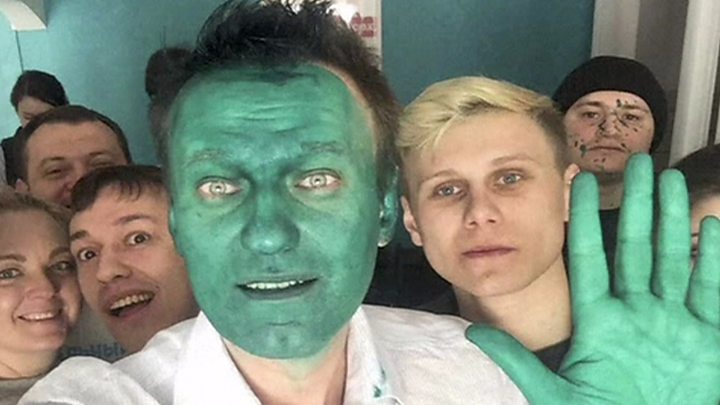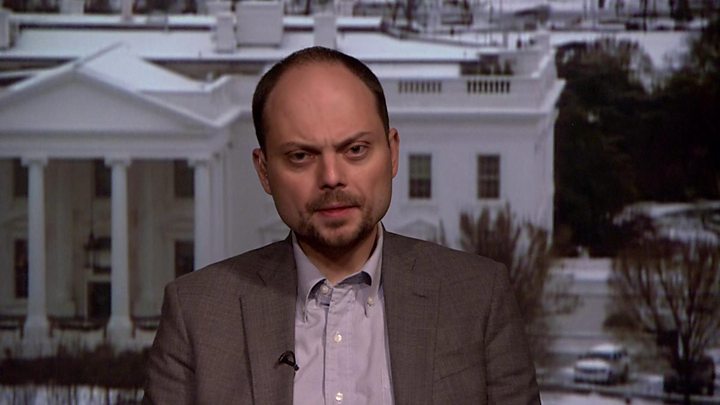The Kremlin has dismissed accusations that President Vladimir Putin sanctioned the poisoning of critic Alexei Navalny.
Spokesman Dmitry Peskov said the allegations were untrue and could not be taken seriously.
Doctors in Germany, where Mr Navalny is being treated, said he had "probably" been poisoned but Mr Peskov questioned why they had "rushed" to that opinion.
Mr Navalny fell ill on a flight from Tomsk to Moscow last Thursday.
His supporters suspect poison was placed in a cup of tea at Tomsk airport.
The flight of the arch-Putin critic was diverted to Omsk, where doctors treated him for three days before he was transferred to the Charité hospital in Berlin.
His condition is serious but not life-threatening, the Berlin doctors say.
The speaker of Russia's lower house of parliament, Vyacheslav Volodin, has ordered a committee to investigate whether foreign forces were behind the suspected poisoning "to fuel tensions inside Russia."
Mr Navalny, 44, made his name by exposing official corruption, labelling Mr Putin's United Russia as "the party of crooks and thieves". He has served several jail terms which he says were the result of politically motivated charges.
There have been a number of previous attacks on high-profile critics or opponents of President Putin, including politicians, intelligence officers and journalists. The Kremlin has always denied involvement.
What did the Kremlin say?
Mr Peskov said of the allegations of President Putin's involvement: "We can't take such accusations seriously. They absolutely cannot be true. They're more like 'empty noise', so we don't intend to take them seriously."
In response, Mr Navalny's spokeswoman, Kira Yarmysh, tweeted: "It was obvious that the crime would not be properly investigated and the culprit found. However, we all know perfectly well who he is."
Mr Peskov said the diagnoses by both Russian and German doctors matched but the "conclusions differ".
"We don't understand why our German colleagues are in such a hurry. The substance hasn't yet been established," he said.
German Chancellor Angela Merkel on Monday called for a Russian investigation into the suspected poisoning. The UK also called for a "full and transparent" investigation.
Mr Peskov said one would only be launched if poisoning were definitely established as a cause.
What is Mr Navalny's condition?
He is in intensive care and still in an artificial coma.
The Charité hospital says that "clinical evidence suggests an intoxication through a substance belonging to the group of cholinesterase inhibitors".
The exact substance has not been identified. The inhibitors can be used to treat conditions like Alzheimer's but can also be used in nerve agents. They block a crucial enzyme meaning that muscles, particularly those associated with breathing, can go into spasm.
Mr Navalny has been treated with atropine. The Kremlin says Russian doctors also noted lowered cholinesterase levels and administered atropine, but found no evidence of poisoning.
Mr Navalny's wife, Yulia, said she feared Russian doctors had delayed his transfer as authorities were trying to wait for evidence of any chemical substance to disappear.
Timeline: Navalny targeted
April 2017: He was taken to hospital after an antiseptic green dye was splashed on his face in Moscow. It was the second time he was targeted with zelyonka ("brilliant green" in English) that year. "It looks funny but it hurts like hell," he tweeted following the attack.

Media playback is unsupported on your device
July 2019: He was sentenced to 30 days in prison after calling for unauthorised protests. He fell ill in jail and doctors said he had suffered an acute allergic reaction, diagnosing him with "contact dermatitis". His own doctor suggested he might have been exposed to "some toxic agent" and Mr Navalny said he thought he might have been poisoned.
December 2019: Russian security forces raided the offices of his Anti-Corruption Foundation, taking laptops and other equipment. CCTV footage showed officials using power tools to get through the door. Earlier that year, his organisation was declared a "foreign agent".
How have other critics fared?
A number of Putin critics have been targeted and not just with poison.
They include politician Boris Nemtsov and journalist Anna Politkovskaya, who were both shot dead.
Intelligence officer Alexander Litvinenko died after his tea was poisoned in the UK by radioactive polonium-210 in 2006.
Journalist and opposition activist Vladimir Kara-Murza is still alive, but has alleged he was poisoned twice by Russian security services. He nearly died after suffering kidney failure in 2015 and went into a coma two years later.

Media playback is unsupported on your device
Another Kremlin critic, Pyotr Verzilov, accused Russia's intelligence services of poisoning him in 2018, when he fell ill after a court hearing, losing his sight and ability to speak.
The same year, former Russian double agent Sergei Skripal and his daughter were poisoned with the Novichok nerve agent in the British city of Salisbury. The UK believes agents from Russia's GRU military intelligence service were behind the attack, but the Kremlin has always denied involvement.
World - Latest - Google News
August 25, 2020 at 07:31PM
https://ift.tt/2Eh8LnL
Alexei Navalny: Kremlin dismisses accusations against Putin - BBC News
World - Latest - Google News
https://ift.tt/2SeTG7d
Shoes Man Tutorial
Pos News Update
Meme Update
Korean Entertainment News
Japan News Update
Bagikan Berita Ini














0 Response to "Alexei Navalny: Kremlin dismisses accusations against Putin - BBC News"
Post a Comment